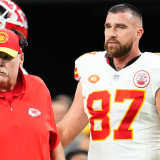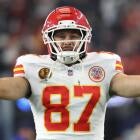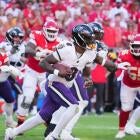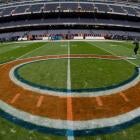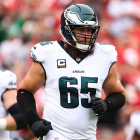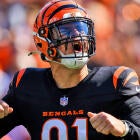Fifty years later, Chiefs-Dolphins playoff thriller still holds title as NFL's greatest Christmas Day game
Miami prevailed in what remains the longest game in NFL history
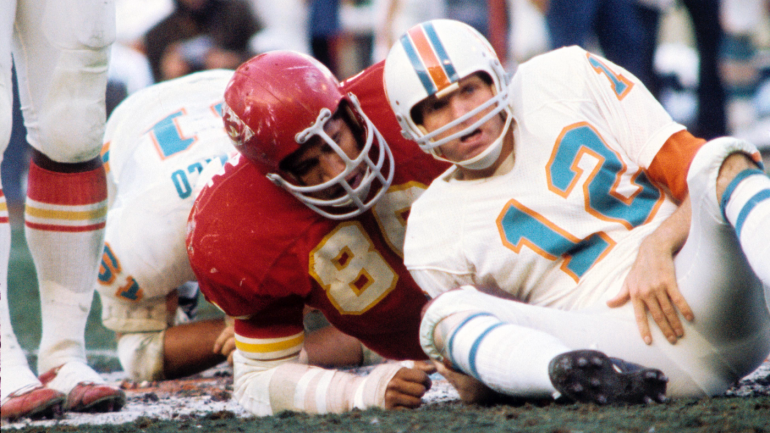
On December 25, 1971, the Dolphins and Chiefs engaged in a game that was an instant classic. Fifty years after its conclusion, Miami's 27-24 overtime win remains the greatest Christmas Day game in NFL history. And at 82 minutes and 40 seconds, it remans the longest game in league annals.
For the first time, the NFL played on Christmas Day, with the Cowboys defeating the Vikings earlier in the day in the divisional round of the NFC playoffs. Dallas' 20-12 win was followed by a playoff game between an established AFC power and an up-and-coming team that was in just its sixth year of existence.
No. 18: “The NFL’s Longest Game” - 1971 Dolphins vs. Chiefs AFC Divisional Playoff (Dec. 25, 1971) #NFL100 @MiamiDolphins
— NFL (@NFL) October 5, 2019
📺: NFL 100 Greatest Games on @nflnetwork pic.twitter.com/9XIwTDxNMR
Two years removed from their 23-7 win over the Vikings in Super Bowl IV, Hank Stram's Chiefs appeared bound for another Super Bowl run after going 10-3-1 during the regular season. Len Dawson and Otis Taylor anchored a Chiefs offense that finished eighth in the NFL in scoring. Kansas City's star-studded defense, led by Hall of Famers Willie Lanier, Buck Buchanan, Emmitt Thomas, Bobby Bell, and Johnny Robinson, allowed just 14.9 points per game during the regular season.
While the Chiefs had already built a history of playoff success, the Dolphins were still in search of their first playoff victory. A perennially bad team during their first four seasons, the Dolphins won 10 games in 1970, Don Shula's first year as Miami's coach after leaving the Colts the previous year. Miami was even better in '71, losing just three games during the regular season.
Like the Chiefs, the Dolphins also had some of the era's best players. The Dolphins' offense enjoyed the talents of quarterback Bob Griese, running backs Larry Csonka, Jim Kiick, and Mercury Morris, receiver Paul Warfield, linemen Larry Little and Bob Kuechenberg. Miami's fabled "No Name" defense, a group that allowed just 12.3 points per game during the regular season, was led by middle linebacker Nick Buoniconti, defensive end Bill Stanfill, defensive tackle Manny Fernandez, and defensive backs Dick Anderson and Jake Scott.
The two teams also possessed two of the best kickers of that era in Kansas City's Jan Stenerud and Miami's Garo Yepremian, two players who would significantly impact what would become the longest game in NFL history.
On a field full of stars, the best performance of the day was turned by Chiefs halfback Ed Podolak, a versatile player who was often overshadowed by the Chiefs' bigger-name players. Podolak was not to be overlooked on this day, as the then-three-year veteran ran for 85 yards and a touchdown on 17 carries and caught eight passes for 110 yards and a score. His first TD -- a 7-yard pass from Dawson -- gave the Chiefs a 10-0 first-quarter lead.
Led by the bruising running of Csonka and Kiick, Miami battled back to even the score at intermission. The teams swapped touchdowns at the start of the third quarter before Podolak's 3-yard touchdown run gave Kansas City a 24-17 fourth-quarter lead. For a third time, Miami responded with a game-tying score after Griese connected with tight end Marv Fleming for a 5-yard score with 1:36 left.
The Dolphins then made a near critical mistake of kicking the ball to the red hot Podolak, whose 78-yard return put the Chiefs in position to win the game. To the shock of everyone, however, Stenerud -- who at that time was considered the greatest kicker in pro football history -- missed a 31-yard attempt to send the game to overtime.
"To this day, I don't really understand why I missed that kick," Stenerud said years later in an NFL Films documentary of that game. "It's a very painful, hurtful thing because you not only disappoint yourself, but you cost the team a chance to go further into the playoffs. So you let down the team and coaches and millions of fans. It's tough to take, and I feel totally responsible for missing that kick."
The score remained tied during the first overtime session after both kickers missed game-winning field goal attempts.
"I remember looking up at him saying, 'Do you think this thing will ever end?'" Podolak recalls asking Buoniconti during overtime.
As the game continued on, extreme fatigue was becoming a factor on both sides.
"I lost like 18 pounds that day," said Csonka, who was largely held in check by the Chiefs' defense for most of the game. "I lost so much weight that my pants were loose."
Csonka appeared to be fine on the game's most crucial play, a play Griese had nearly forgotten about before seeing it on the back of his play sheet before Miami's game-winning drive.
"Here was this play that was one of our favorite plays, one of our best plays that I hadn't run yet that I had forgotten about," Griese recalled. "It was called, 'Roll Right, Trap Left.' When I called this play in the huddle, I'm looking at the (offensive line) and Csonka is next to me, and I could see their eyes light up. 'Where has this play been all day?' I had forgotten about it."
Griese's call worked, as Csonka barreled through the Chiefs' defense for 29 yards to put Yepremian in position to win the game. Yepremian's 37-yard kick was true, as the Dolphins left town their first-ever playoff win.
"As soon as I hit it, I knew it was good," Yepremian said. "I turned my back and I raised my arms, and I saw the biggest, happiest grin on Coach Shula's face."
In the end, the Chiefs and Dolphins put on a show in one of the most memorable games in NFL history; a game that at times appeared would never end.
"It happened," Warfield said of Miami's historic win, "and it happened against one of the greatest teams I ever played against."
The Christmas Day Classic was the beginning of Miami's odyssey that included three straight Super Bowl appearances, back-to-back Super Bowl titles and their undefeated season in 1972. The Chiefs endured a 50-year Super Bowl drought before breaking through in 2019, defeating the 49ers in Super Bowl LIV.


